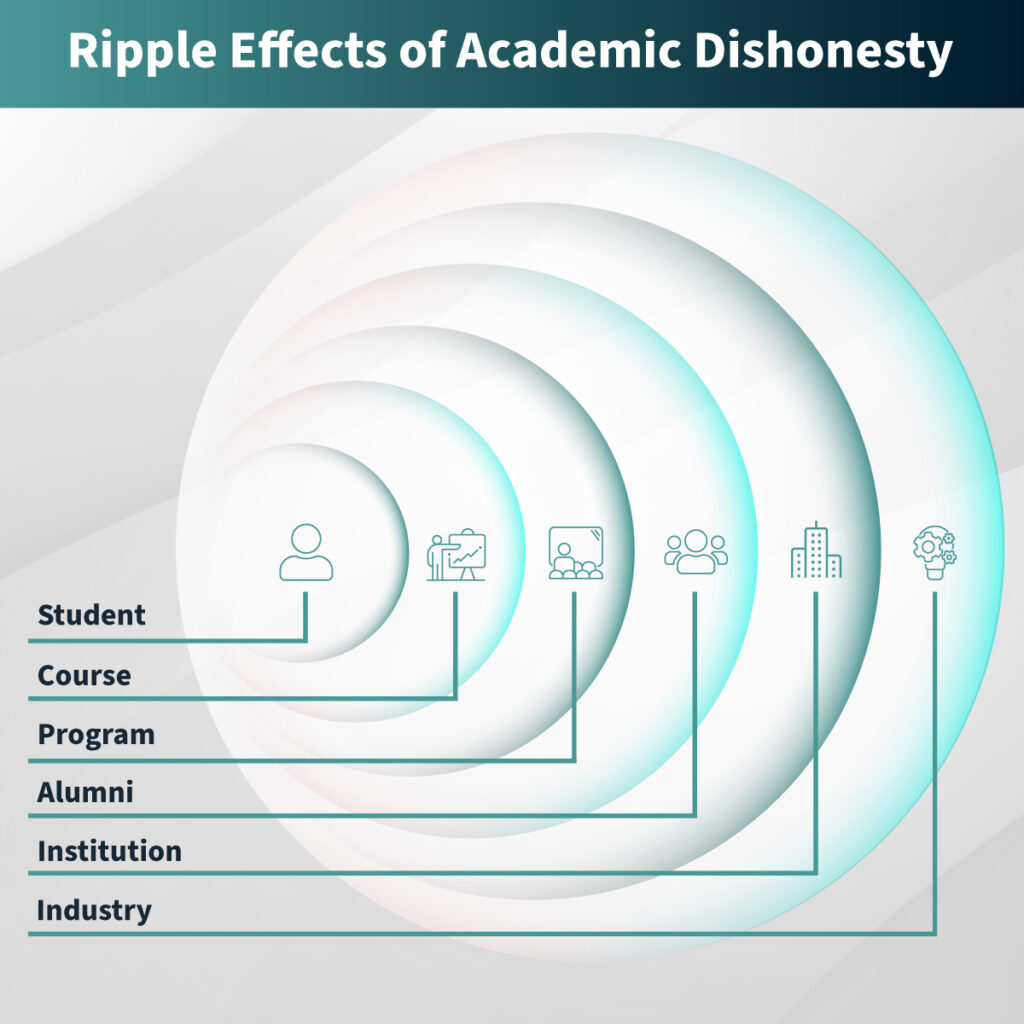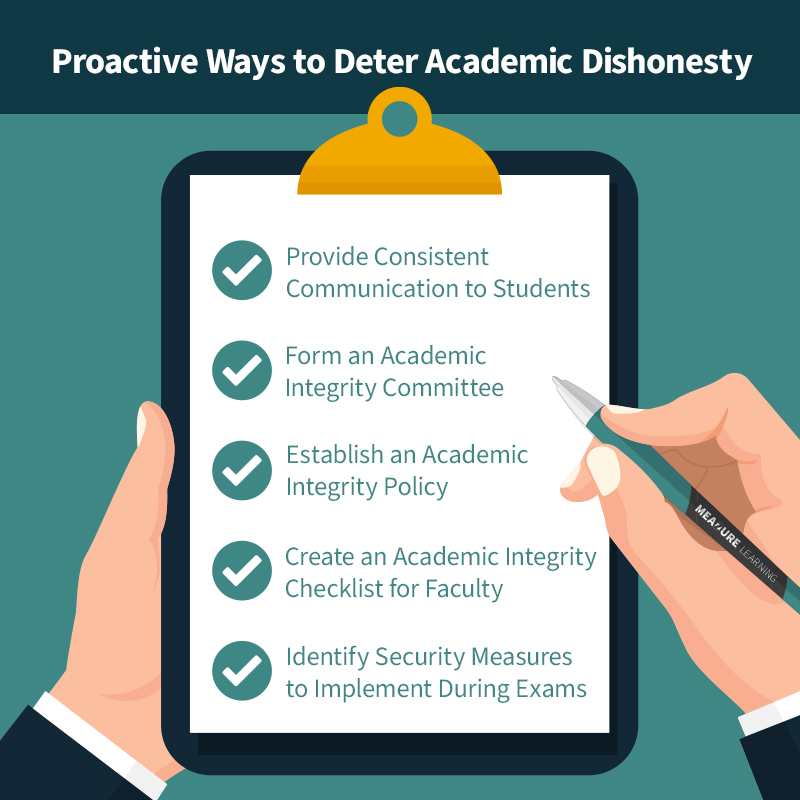The negative effects of academic dishonesty in higher education can be varied and numerous. From financial harm to negative impacts on test-takers, academic dishonesty—or worse, a culture of academic dishonesty—can cause a program or institution damage it may not recover from. Having a clear policy in place for how to prevent academic dishonesty, as well as how to handle cheating when it occurs, is vital to a program’s success and reputation.
In this article, we’ll look at why academic integrity is so important and the negative reputational effects that cheating can have. Then we’ll explore 5 strategies for deterring instances of academic dishonesty.
Academic Dishonesty in Higher Education
Most institutions and instructors already understand the importance of academic integrity. It is the basis of trust between professors and students that lends credibility and respect to academic institutions and the programs they administer. Without academic integrity, degrees become meaningless, as they no longer convey surety in the skills of people entering the workforce. Academic degree programs feeding regulated professions in particular must be vigilant about academic dishonesty. You wouldn’t want unqualified nurses, engineers, accountants, or teachers practicing trades they’re not properly qualified for.
When cheating is allowed, or perceived to be allowed, to persist, students can experience moral disengagement. This moral disengagement can lead even honest students to cheat, as their personal morality degrades based on perceived acceptable behaviors.
Negative Reputational Effects of Academic Dishonesty in Higher Education

Cheating scandals can rock institutions, even those as established as Harvard or the U.S. Naval Academy. The danger of cheating comes—not only from organized, collusive groups in a large-scale operation—but also from individual students who are tempted to cheat on their own. This can make a culture of academic dishonesty a widespread problem that is difficult or impossible to prevent or disrupt. Once a pattern of academic dishonesty is exposed, it can lead to negative press coverage for an institution or program, which can have devastating effects on an institution’s reputation and credibility. Here are just a few ways academic dishonesty can affect your institution.
Loss of Accreditation
Negative press coverage is only the beginning in some circumstances. From that coverage can come investigations that may lead to a loss of accreditation, conditional accreditation, or closure of a degree program. This loss of accreditation can ruin an institution’s reputation, making it nearly impossible to achieve enrollment goals and graduate qualified candidates. Losing accreditation in academic institutions is a devastating blow to any program. However, it’s especially damaging to programs providing candidates for licensed professions, eroding the public’s trust in an institution’s programs. In some cases, the entire institution shuts down because of a cheating scandal, making it impossible to recover the loss.
Even if an institution quickly and efficiently responds to the cheating scandal, the reputational damage may already be complete. Many news outlets cover the beginning of a story—highlighting the scandal and the outcomes of the academic dishonesty—but don’t follow up to see how the institution dealt with the scandal or what means it put into place to assure it doesn’t happen again. Coverage of a recent civil suit regarding a pre-exam room scan in Ohio left out the results of that suit as well as important context regarding the judge’s ruling, leaving Cleveland State University with a reputational disaster.
Declining Enrollment
Aside from a possible loss of accreditation, your institution may suffer reputational harm from the negative press exposure from a cheating scandal—exposure that may directly impact enrollment. If students can’t trust the credentials a university bestows, why would they choose to spend their money on tuition there? If one program’s credibility is called into question, it may affect other programs as well, causing potential applicants to shun institutions that have had any publicized instances of academic dishonesty. Students already enrolled may even seek enrollment elsewhere, as they see their degree potentially devalued.
Employment Credibility
Academic dishonesty can have dire institutional outcomes even if it doesn’t affect student retention or enrollment. If a company hires graduates from a program and finds they are not qualified to do the work that’s required, they may not hire from that program again. If a program consistently provides a degree to unqualified candidates, they may eventually lose their accreditation, causing irreparable harm to the institution, both financially and reputationally.
Strategies for Deterring Academic Dishonesty
While it is important to respond to cheating when it’s discovered, it’s a far better strategy to prevent it. Doing so may minimize the potential negative impacts on your exam or degree program and strengthens student trust in your institution. Here are some useful strategies for deterring academic dishonesty.

Consistent Communication
Provide consistent communication about testing expectations and what constitutes academic dishonesty. Recent studies show that 18% of students do not think the use of unauthorized materials on an exam counts as cheating. Providing clear instructions as to what constitutes academic dishonesty—as well as what the consequences of academic dishonesty are—can vastly reduce its likelihood.
Academic Integrity Committee
Form a campus academic integrity committee. Include representatives from your institution’s faculty, student body, and administrative staff. Task the committee with activities such as conducting a survey to determine the current culture and understanding of academic integrity or crafting an institution-wide policy on academic integrity. It can also investigate possible instances of academic dishonesty as well as identify new methods of cheating as they arise, e.g., ChatGPT or companies such as Chegg or Course Hero. Because an academic integrity committee is campus-wide, it can also provide faculty members and instructors with resources to combat academic dishonesty, making them feel supported in their work.
Academic Integrity Policy
Have students attest to an academic integrity policy before testing or as part of the syllabus contract. Once you’ve clearly communicated your academic integrity policy and the consequences of violating that policy, ask your students to acknowledge their understanding. Allow for questions and discussion if necessary to provide clarity. Some exam delivery programs—such as the ProctorU Proctoring Platform—require test-takers to sign an acknowledgement of an academic dishonesty policy at the start of their exam.
Academic Integrity Checklist
Give faculty an academic integrity checklist, including a list of best practices to address integrity concerns in the classroom. Develop a robust academic integrity policy, and remind faculty of it regularly. Encourage—or require—faculty members to complete an academic integrity checklist for each course and exam they administer.
Security Measures During an Exam
Implement security measures during exam administration and delivery. There are numerous tactics that have proven to prevent, deter, and detect academic dishonesty. Of immeasurable importance is the inclusion of a human proctor. The presence of someone who actively monitors test-taker behavior can greatly decrease instances of academic dishonesty. You can set up an exam to be continually monitored by a human proctor in real time, or you can implement a system for a proctor to review footage of the exam after it is complete. If your exams are administered online, there are many software-based security measures you can take to mitigate academic dishonesty.
Conclusion
Academic institutions face a series of negative ripple effects when widespread cheating occurs on campus. From bad press to changes in accreditation status, enrollment declines, and more, these effects can have a devastating impact on an institution’s present reputation and future enrollment. However, there are a variety of ways to mitigate instances of academic dishonesty in higher education and ensure that a culture of academic dishonesty does not develop at your institution. Reducing the instances of cheating safeguards your program, degree, and institution’s reputation from harm.
To learn more about the impacts a culture of cheating can have on college students, read our previous article.